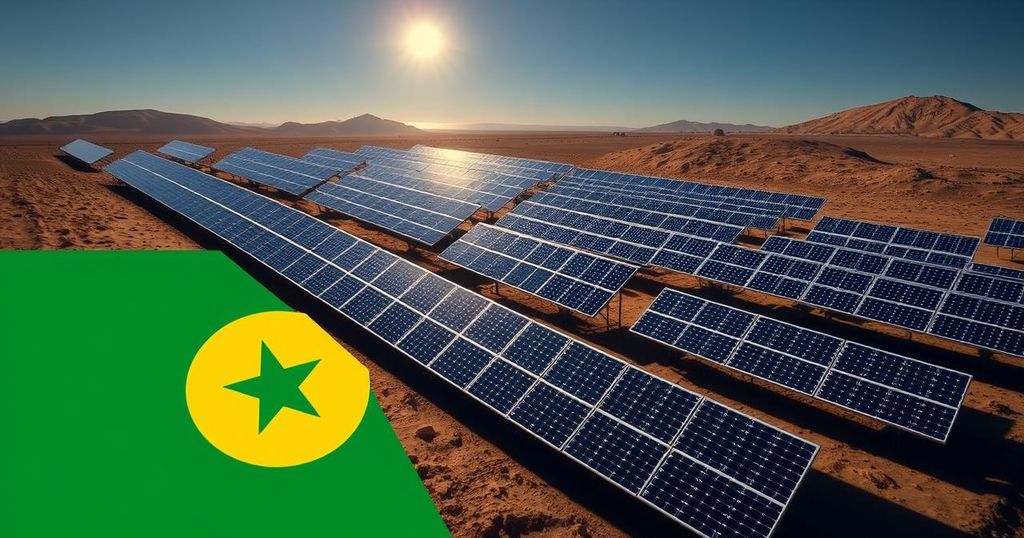Egypt has launched a solar power project in Djibouti, aiming to provide alternative energy and decrease Djibouti’s dependence on Ethiopia. The initiative involves building a solar farm with a capacity of 276.5 kilowatts, funded by Egypt, which will also train local technicians. This partnership marks a significant strategic alliance in the context of regional tensions over water and energy resources.
Egypt has strengthened its relationship with Djibouti by initiating a solar power project aimed at providing alternative energy sources to the Horn of Africa nation. This initiative is notable as it seeks to reduce Djibouti’s dependency on Ethiopia amidst the ongoing tensions between Egypt and Ethiopia over vital resources. The project will facilitate the construction of a solar power farm in Djibouti’s arid deserts, with future expansion potential up to 300 kilowatts. Funding for the project will be provided by Egypt, which will also offer training for Djiboutian technicians in its operation. The agreement was recently signed virtually by Egyptian Energy Minister Mahmoud Essmat and his Djiboutian counterpart, Yonis Ali Gued, with discussions primarily focusing on economic cooperation while remaining circumspect about the broader geopolitical implications. Djibouti’s government noted that the partnership is not only a step forward in bilateral relations but also aligns with President Ismail Omar Guelleh’s commitment to prioritizing energy resources for national economic and social growth. The agreement specifically pertains to the supply and installation of solar panels in proximity to the village of Omar Jaggaa. Analysts are not overlooking the wider ramifications of this cooperation, especially concerning the historically contentious relationship between Egypt and Ethiopia, particularly over the Nile water rights and mutual security in the Horn of Africa. Ethiopia and Djibouti maintain strong trade ties, with a significant volume of goods imported by Ethiopia from Djibouti, and Djibouti heavily reliant on Ethiopian electricity for its domestic and industrial needs. Ethiopia’s strained relations with neighboring Somalia over maritime agreements, along with Djibouti’s previous invitation to Ethiopia to develop a new port, further illustrate the intricate dynamics of the region. Moreover, recent infrastructure developments, such as the completion of a $138 million power transmission line funded by the African Development Bank, underscore Djibouti’s increasing energy consumption, particularly due to expanding business at its port. Current estimates project that Djibouti’s electricity demand may reach 1GWh daily by 2030, necessitating further investments in renewable energy sources like solar and geothermal. The World Bank reports a significant increase in electricity accessibility, climbing from 65 percent of the population to 72 percent with the upgraded transmission line, and potentially more once the solar project begins operations.
The ongoing geopolitical tensions in the Horn of Africa have dramatically shaped the energy and trade relations among Egypt, Ethiopia, and Djibouti. Egypt has been keen to forge closer ties with Djibouti as a strategic counterweight against Ethiopia amid disputes concerning the Nile River and energy allocations. Djibouti’s geographical position makes it a critical hub for maritime and trade links, particularly for Ethiopia, which relies on it for most of its imports. Moreover, the regional energy landscape is evolving, as countries seek sustainable and renewable energy solutions to meet escalating demands. Djibouti’s pivot towards alternative energy sources aligns with its broader goals of economic development and energy independence.
In summary, Egypt’s new solar project in Djibouti represents both an economic partnership and a strategic maneuver aimed at counterbalancing Ethiopia’s influence in the region. As energy demands rise and geopolitical dynamics shift, this initiative highlights the interconnectedness of socio-economic and political factors in the Horn of Africa. The solar power farm will not only bolster Djibouti’s energy infrastructure but also exemplifies Egypt’s commitment to enhancing regional alliances against potential adversarial elements.
Original Source: www.theeastafrican.co.ke






